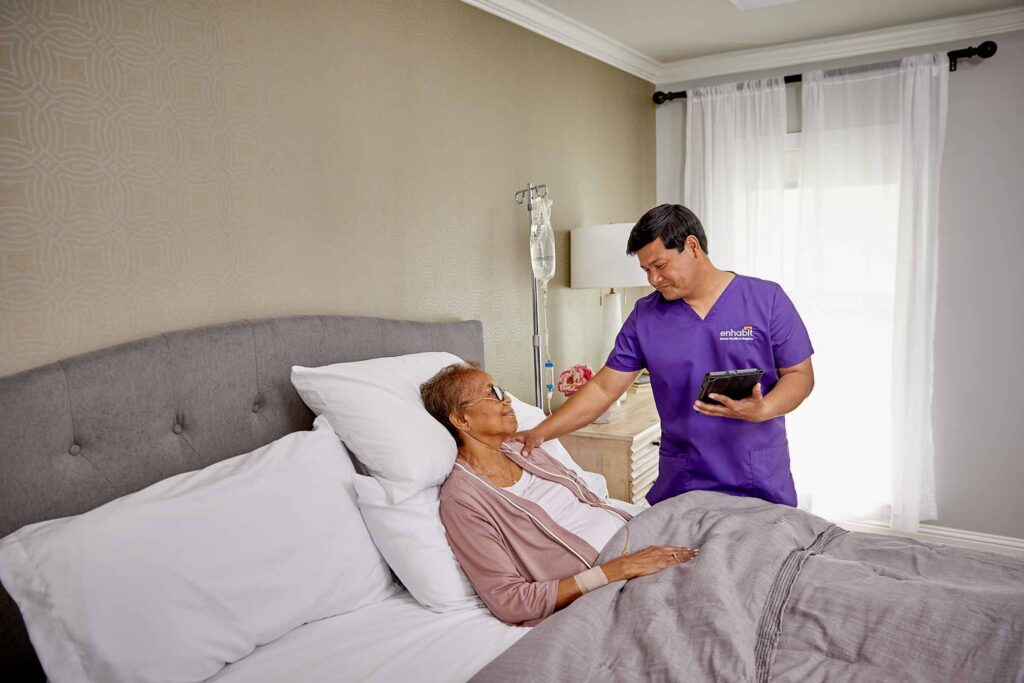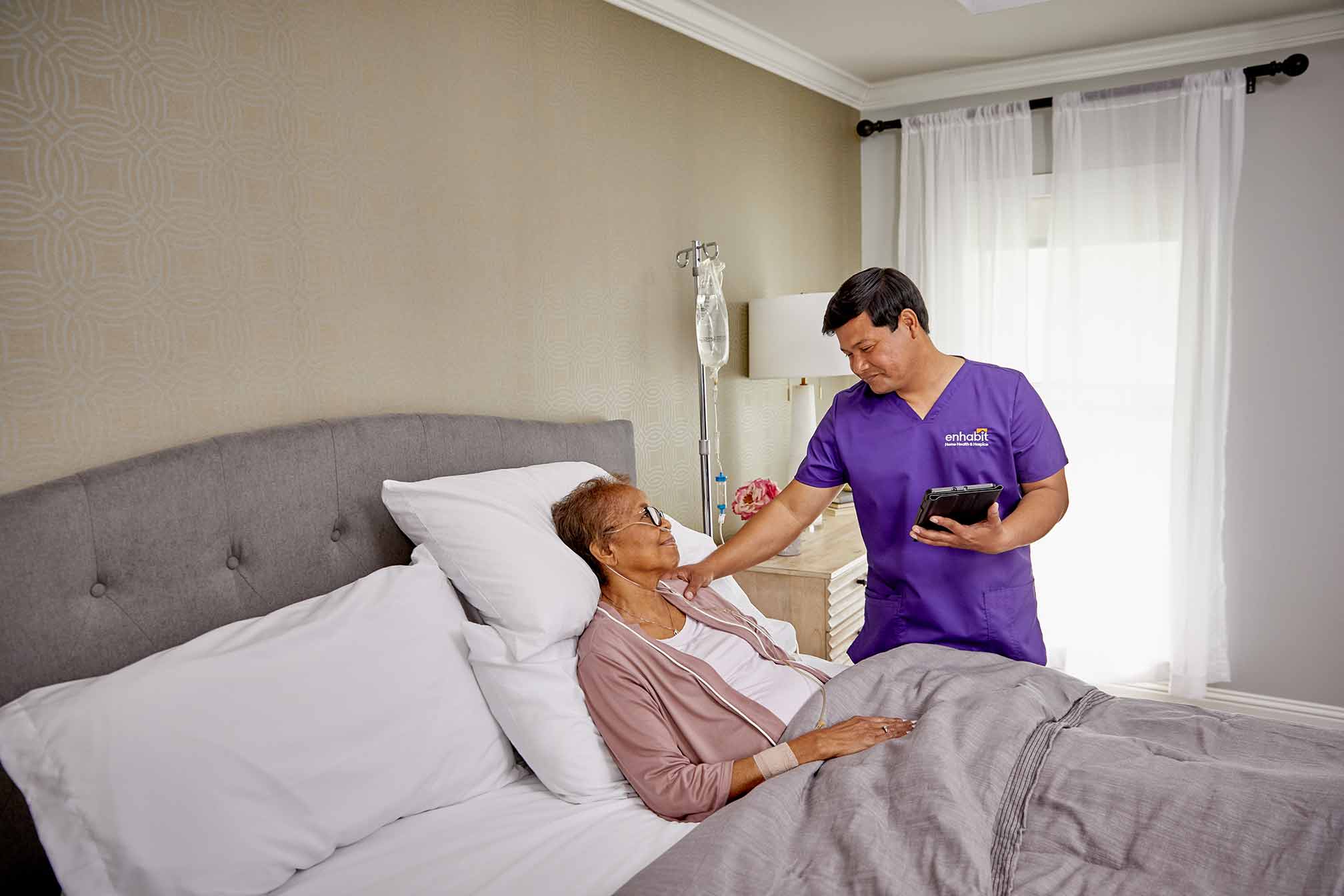Choosing a hospice provider is a big decision. Your chosen provider will spend a lot of time with you and your loved ones throughout the end-of-life journey.
You should feel confident that the provider you choose will be able to give you and your loved one the high-quality, compassionate care you deserve. Throughout my almost 20 years in the home-based care industry, I have learned a lot about what makes a quality provider and what doesn’t.
To help facilitate the process of choosing a hospice provider, I have rounded up the things I’ve learned are most important when looking for high-quality hospice care for yourself or your loved one.
Comparing hospice providers
You can compare hospice providers via the Care Compare tool on the Medicare website. This will show you general information about the hospice provider and highlight the type of care they provide.
A good quality metric to compare hospice providers is Hospice Visits in the Last Days of Life (HVLDL). The HVLDL measures the percentage of hospice patients that receive an in-person visit from either a registered nurse or medical social worker on at least two of the three final days of a patient’s life.
You may be asking yourself “why is this important to know?” Well, this metric highlights the ability of the provider to meet the needs of the patients and loved ones in the last days of a patient’s life, when care needs typically become more urgent.
If a provider has a high HVLDL percentage, you can count on them being able to offer support every step of the way, up until the very last days.
Choosing a hospice provider that aligns with your preferences
Adhering to your care preferences should be the top priority when choosing a hospice provider. You will want to make sure that they have the ability, focus and driving goal of delivering the exact care you want and deserve.
Medicare-certified
Medicare-certified providers are required to meet certain standards of care and are routinely inspected to ensure compliance. Choosing a Medicare-certified agency, such as Enhabit Home Health & Hospice, means you or your loved one will receive high-quality, compassionate end-of-life care.
The Medicare hospice benefit will also cover the cost of hospice care, as long as you meet the qualifying criteria. Typically, Medicare Advantage plan members convert to Medicare when they access the hospice benefit. Additionally, most commercial plans cover hospice, but it is important to check with your plan.
Location
Most people want to spend the end of their life in their home, surrounded by people and things that matter the most. If this is important to you or your loved one, then choosing a hospice provider that will come to wherever you call home – whether your house, your child’s house or an assisted living facility – should be a priority.
Providing equipment
When people begin hospice care, it often comes along with the need for more specialized medical equipment such as hospital beds, bedside commodes, wheelchairs, oxygen tanks, etc.
Medicare-certified hospice providers will supply you with the durable medical equipment (DME) you or your loved one needs to prioritize comfort at no cost to you.
Pain and symptom management
Hospice has different goals than home health care. While home health care is focused on recovery and better outcomes, hospice’s core tenet is to provide comfort and dignity.
It is important to know how a provider will achieve safe, effective pain management. Do they have a record of offering gentle, respectful and compassionate care? Will they actively listen to my wants and needs and adjust accordingly?
At Enhabit, we take the time to understand what matters most so we can focus on each patient’s needs on a deeper level. This ensures we can implement a plan of care that best serves them and their loved ones. That way, we are always prioritizing a patient’s comfort while adhering to their wishes.
Interdisciplinary and highly collaborative care
If choosing a Medicare-certified hospice provider, you will receive an interdisciplinary care team. This care team is made up of:
- Physician of your choice (either hospice-appointed medical director or your attending physician)
- Nursing staff
- Social workers
- Chaplains
- Bereavement specialists
- Hospice aides
- Volunteers
- Therapists
Learn more about who makes up the hospice care team here.

Choosing a hospice provider that supplies round-the-clock, high-quality hospice care
Whenever a patient is facing a terminal illness, it is common that they might experience symptoms they are not used to. This new onset of symptoms and uncertainty of what they are might lead to more frequent trips to the emergency department to check vital signs.
When you choose a hospice provider that supplies round-the-clock care, it oftentimes prevents trips to the emergency department. Hospice care provided 24/7 means nurses are available at any time of the day or night to come to your home for vital checks and further consultation.
Care planning and education
A high-quality hospice provider will certainly provide superior care to patients, but also be a wealth of knowledge for families and caregivers too. In addition to educating on what to expect as the disease progresses, end-of-life planning is often needed throughout the end-of-life journey as well.
Many people choose not to talk about end-of-life care conversations until a life-threatening moment or situation arises. I believe it is so important to start advance care planning and know what your family members would prefer in regard to their health care.
The end-of-life journey is already hard. Having these conversations early makes a difficult situation just a bit easier.
Enhabit provides resources and education for end-of-life decisions. Our staff will:
- Provide the forms you need to begin advance care planning
- Help you understand each advance care planning form
- Determine the right care at the right time
- Provide medical, spiritual and emotional support for both patients and their family members
Open lines of communication are important in choosing a hospice provider
Once again, entrusting someone with your or your loved one’s care at a vulnerable time is a big choice to make. That being said, it is critical to have a care team you can communicate with and trust.
At Enhabit, communication is a core company value. We expect transparent and respectful communication. We believe frequent, positive communication helps us connect with patients, their loved ones and each other.
Caregiver resources before, during and after the end-of-life journey
Did you know that hospice isn’t only for the patient, but for the patient’s family as well? A high-quality hospice provider should make this clear when you or your loved one start care.
Medicare-certified hospice providers will offer bereavement support for patient’s families for up to 13 months after a patient’s passing. At Enhabit, these resources include:
- Personalized memorial services
- Frequent communication with family and friends
- Grief counseling
- Healing resources for loved ones
When you choose the right hospice provider, you can rest easy knowing that your or your loved one’s care is in the right hands. And just because the end-of-life journey is over, doesn’t mean that the support ends right then and there.
To help you feel confident in choosing the right hospice provider, print out this article, download the Medicare-coverage checklist and bring both resources with you to you or your loved one’s physician when discussing end-of-life care options.
At Enhabit, our promise is to provide A Better Way to Care® to every patient wherever they call home. Visit our website to find a location near you and talk to your physician about a referral to our services.
Social Share
At Enhabit our patients are our number one priority. From providing the latest medical practices to building deep personal connections, we’re focused on upholding every patient’s dignity, humanity and sense of control on their health care journey.
Home health
Our home health services give patients access to the care they deserve in the comfort of their own homes. From disease and injury management to recovery from surgery, our clinicians help patients confidently achieve their healthcare goals.
Hospice care
Our hospice care services place importance on the comfort of every patient living with a terminal illness. Our caring professionals are dedicated to providing not just physical care, but spiritual and emotional support to every patient and their loved ones.






